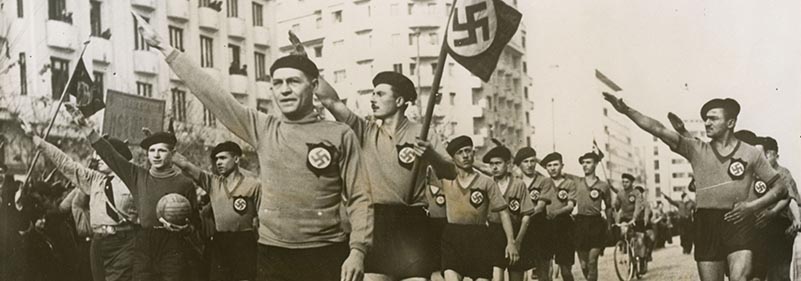.jpg)
Fascism continues to be to date one of the most intriguing and debated radical political phenomena of the twentieth century. The reasons for this continued scholarly interest have to do primarily with fascism's complexity, its vast mass appeal, the fanaticism it instilled in its followers, and with its tremendous political impact, with strong reverberations in contemporary politics. Although, with the exception of Germany and Italy, fascists almost invariably failed to gain full political power by their own means, their ideas, new style of politics, and concerted assault on the established parliamentary regimes and international order shaped politics in interwar Europe, the period being euphemistically dubbed the "era of fascism."
But the influence of fascism extends well beyond the interwar period. On the one hand, its ideological roots go back in time to the Enlightenment, Romanticism, and the intellectual and political atmosphere of the turn of the nineteenth to the twentieth centuries. On the other hand, the legacy of fascism had a strong impact on post-1945 politics and has resurfaced with vigor in the post-Cold War world, prompting scholars to speak of neo-fascism.
Until recently, the study of fascism was encapsulated in national historiographical traditions, a situation leading to academic isolation, parochialism, and extreme politicization. The downfall of the communist system in 1989-1991 and the end of the Cold War, the liberalization of historical discourses, the opening up of new archival collections for scientific research, the intensification of academic exchange and interaction between ‘local’ and ‘foreign’ scholars, and the emergence of a new generation of researchers challenge scholars of fascism to experiment with new transnational approaches, such as cultural history, shared/entangled history, history of transfers, and histoire croisée.
In this context, the aims of the new International Association for Comparative Fascist Studies (COMFAS) is to promote new inter-disciplinary, transnational studies on the history of fascism at European and global levels. The Association provides a meeting ground for comparatively-minded scholars from various academic disciplines working on the history of fascism and the radical right. Its aim is to stimulate the coordination of teaching and research activities on fascism and the radical right, potentially leading to synergy in research and cross-national initiatives.
To these ends, COMFAS organizes bi-annual conferences. and encourages other related transnational research initiatives. The Association has developed in close cooperation with Fascism. Journal of Comparative Fascist Studies (Leiden: Brill). It has also initiated new publication venues, including two books series with Routledge and CEU Press. It is hoped that the interaction and common socialization among the network members will lead to the organization of new thematic colloquia, workshops, summer schools, and research projects leading to innovative publications.
It is our claim that the study of fascism can function as a driving force of historiographical innovation, facilitating academic cross-fertilization among multiple research fields and clustering interdisciplinary approaches pertaining to socio-cultural history, gender history, and transnational history, to name but a few.
Join now and become part of an international community of distinguished scholars!
Prof. Dr. hab. Constantin Iordachi
Central European University, Budapest

